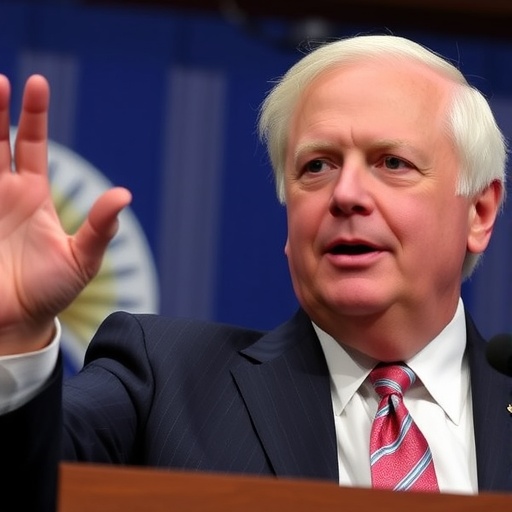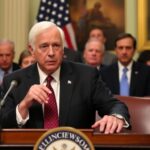Government shutdown Surpasses 20 Days: Speaker Johnson Warns of Record as Republicans Insist on Healthcare Cuts in Stalled Negotiations
In a tense standoff that’s gripping the nation, the U.S. Government shutdown has dragged on for 20 days, with House Speaker Mike Johnson issuing a stark prediction: this impasse could etch itself into history as the longest ever. Republicans are holding firm, conditioning any negotiations on Democrats abandoning proposed modifications to sweeping healthcare cuts, leaving federal workers, essential services, and the economy in limbo. As frustration mounts, recent polls reveal a divided public pinning equal blame on both parties, amplifying the political drama unfolding in Washington.
- Speaker Johnson’s Grim Forecast: A Shutdown Set to Shatter Records
- Republican Ultimatum: No Talks Without Concessions on Healthcare Cuts
- Polls Expose Bipartisan Blame Game in Public Frustration
- Economic and Human Toll Mounts: Stories from the Frontlines of the Shutdown
- Uncertain Horizons: Will Bipartisan Breakthrough End the Standoff?
Speaker Johnson’s Grim Forecast: A Shutdown Set to Shatter Records
House Speaker Mike Johnson, a key figure in the Republican leadership, didn’t mince words during a press conference on Capitol Hill yesterday. “We’re on the brink of the longest Government shutdown in American history,” Johnson declared, his voice carrying the weight of the chamber’s divided halls. The current shutdown, triggered by disagreements over a massive spending bill, has already surpassed many infamous precedents, but Johnson warns it could eclipse the 21-day record set during the 1995-1996 budget battle under President Bill Clinton.
To understand the gravity, consider the historical context. The 1995-1996 shutdown furloughed over 800,000 federal employees and cost the economy an estimated $1.4 billion, according to the Congressional Budget Office. Today’s crisis, now at 20 days, has already idled more than 2 million non-essential workers, with agencies from the Department of Defense to the National Parks Service operating on skeleton crews. Johnson’s prediction isn’t hyperbole; with no breakthrough in sight, analysts from the Bipartisan Policy Center estimate the shutdown could extend another week or more, pushing it into uncharted territory.
Behind the scenes, Johnson’s office has been flooded with calls from constituents. “Families are hurting,” he emphasized, pointing to the ripple effects on everything from Social Security payments to air traffic control. Yet, his Republican allies remain resolute, viewing the shutdown as a necessary stand against what they call fiscal irresponsibility. This stance has drawn sharp criticism from Democrats, who accuse Johnson of playing politics with people’s livelihoods.
Republican Ultimatum: No Talks Without Concessions on Healthcare Cuts
At the heart of this government shutdown lies a contentious demand from Republicans: Democrats must drop all modifications to proposed healthcare cuts before negotiations can resume. The sticking point revolves around a Republican-backed bill that aims to trim $2 trillion from federal healthcare spending over the next decade, targeting programs like Medicaid expansion and Affordable Care Act subsidies. Republicans argue these cuts are essential to curb ballooning deficits, which hit $1.7 trillion last fiscal year per Treasury Department data.
Speaker Johnson elaborated on the Republican position during a Fox News interview, stating, “We can’t continue pouring money into a broken system. Democrats’ tweaks would only delay the inevitable reforms needed to protect taxpayers.” The proposed cuts include reducing funding for low-income health clinics by 15% and imposing stricter eligibility for Medicare Advantage plans, measures that Republicans say will save $500 billion annually. However, Democrats counter that these changes would strip coverage from 20 million Americans, citing projections from the Kaiser Family Foundation.
The impasse began when Senate Democrats introduced amendments to soften the healthcare cuts, such as preserving rural hospital funding and expanding mental health services. Republicans, led by Johnson, rejected these outright, walking away from the negotiating table on day 10 of the shutdown. “It’s a non-starter,” said Rep. Tom Emmer, R-Minn., a close Johnson ally. “Without agreement on core fiscal principles, there’s no point in talking.” This hardline approach has stalled bipartisan talks, with Senate Majority Leader Chuck Schumer labeling it “extortion” in a fiery floor speech.
Insiders reveal that private negotiations have been attempted twice in the past week, only to collapse over the healthcare issue. One anonymous GOP aide told reporters, “We’re prepared to hold the line as long as it takes.” This brinkmanship echoes past shutdowns, like the 2018-2019 border wall dispute, but with higher stakes given the healthcare implications.
Polls Expose Bipartisan Blame Game in Public Frustration
As the government shutdown wears on, public opinion is fracturing along predictable lines, but with a surprising twist: both Republicans and Democrats are shouldering equal responsibility in the eyes of voters. A new Quinnipiac University poll released this morning shows 48% of Americans blaming Republicans for the impasse, 47% pointing fingers at Democrats, and just 5% undecided. This near-even split marks a shift from earlier surveys, where Republicans held a slight edge in fault attribution.
The poll, conducted among 1,200 registered voters, also highlights deepening anxiety. 62% of respondents reported concerns about delayed government services, up from 55% a week ago. Among independents, a crucial swing group, disapproval of congressional handling of the crisis stands at 71%, per the data. “Voters are fed up with the gamesmanship,” said Tim Malloy, polling director at Quinnipiac. “This even blame suggests neither side is winning the PR battle.”
Breaking it down further, the survey reveals stark partisan divides. 82% of Democrats blame Republicans, while 79% of Republicans fault Democrats. But cross-party frustration is evident: 35% of Republicans now say their own party’s stance on healthcare cuts is too rigid, a 10-point jump since the shutdown began. Social media is ablaze with hashtags like #EndTheShutdownNow, amassing over 500,000 posts in the last 24 hours, according to Brandwatch analytics.
Experts like Larry Sabato, director of the University of Virginia Center for Politics, weigh in on the dynamics. “Speaker Johnson’s prediction is amplifying the pressure, but the equal blame could force compromise—or entrench positions further,” Sabato noted in an op-ed for Politico. As negotiations remain frozen, this public sentiment could prove pivotal in swaying lawmakers back to the table.
Economic and Human Toll Mounts: Stories from the Frontlines of the Shutdown
Beyond the Beltway battles, the 20-day government shutdown is exacting a real-world price on everyday Americans. Furloughed federal employees, numbering over 800,000 according to the Office of Personnel Management, are dipping into savings or relying on food banks to make ends meet. In Virginia, home to thousands of Pentagon workers, local charities report a 40% surge in demand for emergency assistance.
Take Sarah Jenkins, a 42-year-old IRS auditor from Maryland, whose story has gone viral on TikTok. “I’ve got two kids and a mortgage,” Jenkins shared in a video viewed 2 million times. “This shutdown means no paycheck, and Speaker Johnson’s talk of records doesn’t pay the bills.” Her plight underscores the human element: the federal government employs 2.1 million civilians, and while essential workers continue unpaid, the uncertainty is eroding morale.
Economically, the damage is mounting. Moody’s Analytics estimates the shutdown has already shaved 0.2% off GDP growth for the quarter, with potential losses reaching $6 billion per week if prolonged. Small businesses near national parks, like those in Yellowstone, have lost $50 million in revenue since closures began, per the U.S. Travel Association. Air travel is snarled too, with FAA delays costing airlines $100 million daily.
In the healthcare arena, the shutdown exacerbates existing strains. CDC disease outbreak responses are hampered, and NIH research grants are frozen, delaying trials for cancer and Alzheimer’s. One poignant example: Dr. Elena Vasquez, a researcher at the National Institutes of Health, told CNN, “We’re pausing studies that could save lives—all because of healthcare cuts debates.” Veterans Affairs hospitals are rationing supplies, affecting 9 million enrollees.
State governments are stepping in where they can. California Governor Gavin Newsom announced $100 million in emergency aid for affected workers, while Texas Republicans urged fiscal restraint. Yet, as Republicans condition progress on their demands, the human cost continues to climb, turning abstract policy into personal hardship.
Uncertain Horizons: Will Bipartisan Breakthrough End the Standoff?
Looking ahead, the path out of this government shutdown remains shrouded in uncertainty, with negotiations hinging on whether Democrats will yield on healthcare cuts. Speaker Johnson has scheduled closed-door meetings with GOP leaders for tomorrow, signaling internal pressure to find common ground. Meanwhile, President Biden’s administration is pushing for a short-term funding bill to reopen agencies, but Republicans dismiss it as a “band-aid” without deeper reforms.
Analysts predict several scenarios. In the optimistic case, a compromise could emerge by week’s end, perhaps softening some healthcare cuts in exchange for spending caps elsewhere. The Bipartisan Policy Center models show such a deal could avert $18 billion in additional economic losses. However, if Republicans hold firm, the shutdown might spill into the holiday season, risking Johnson’s speakership and midterm fallout.
External factors could tip the scales. The Federal Reserve’s upcoming interest rate decision might highlight fiscal instability, pressuring lawmakers. Internationally, allies like the EU are watching closely, with trade negotiations potentially affected. As one Hill staffer put it anonymously, “This isn’t just about healthcare—it’s about who controls the narrative going into 2024.”
For now, families like the Jenkins wait, hoping Johnson’s dire warning catalyzes action rather than inertia. The nation holds its breath, wondering if history’s longest shutdown can be averted or if Washington’s gridlock will define yet another chapter in American politics.








